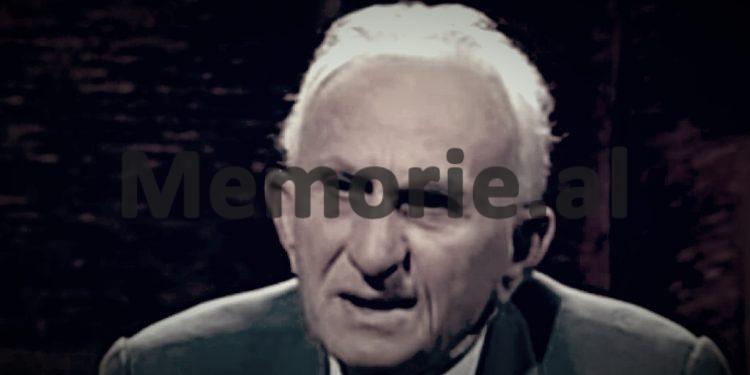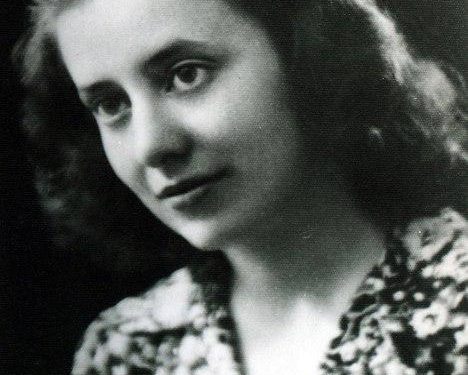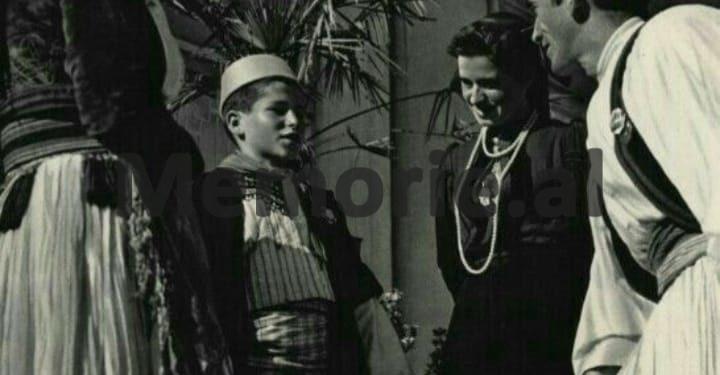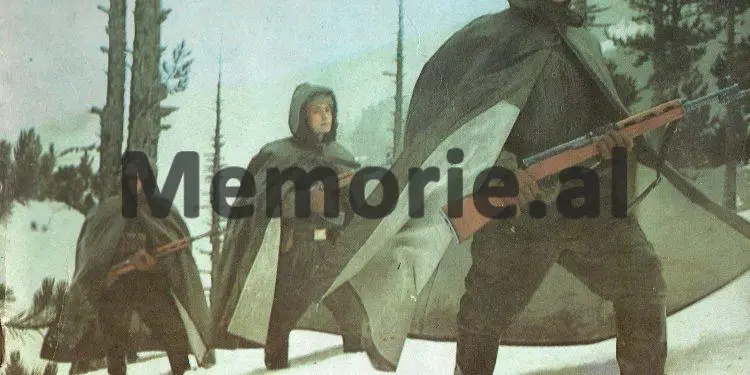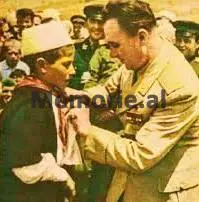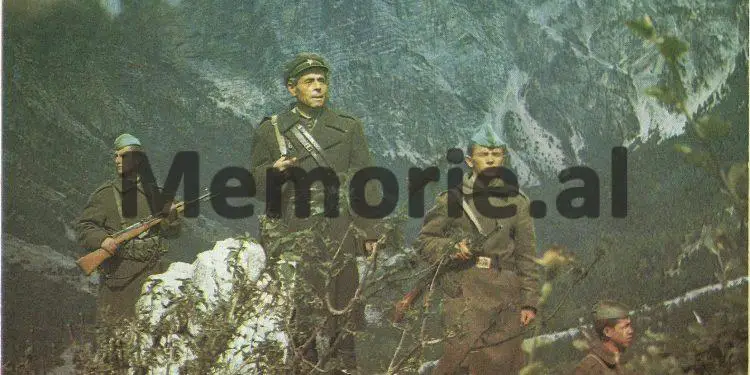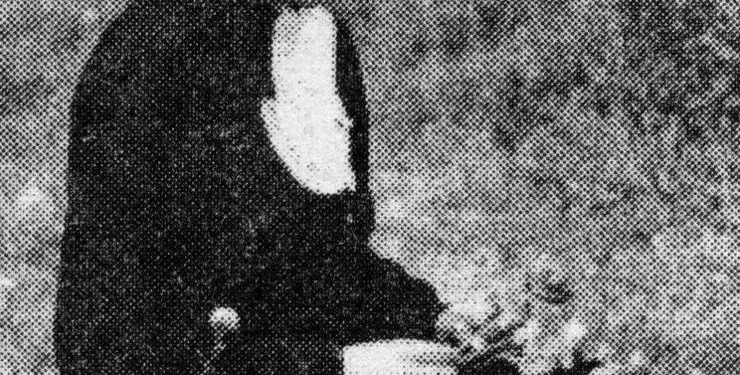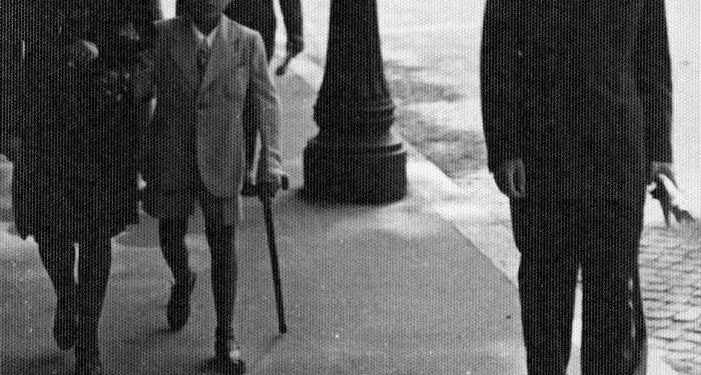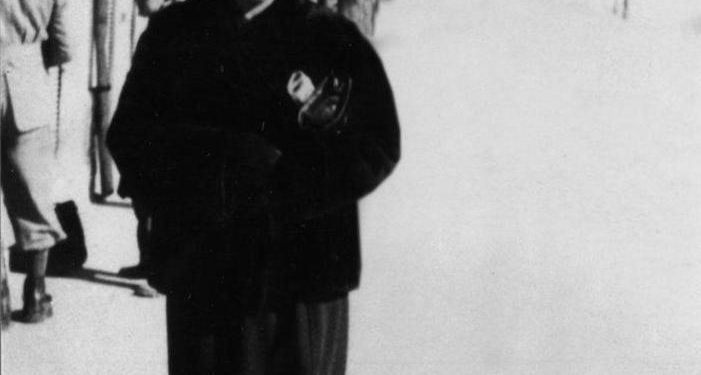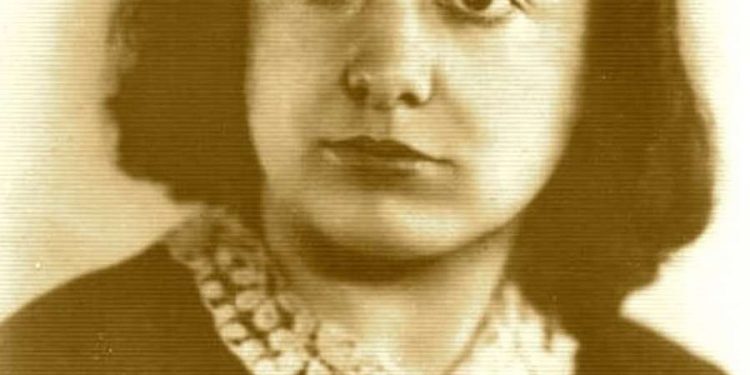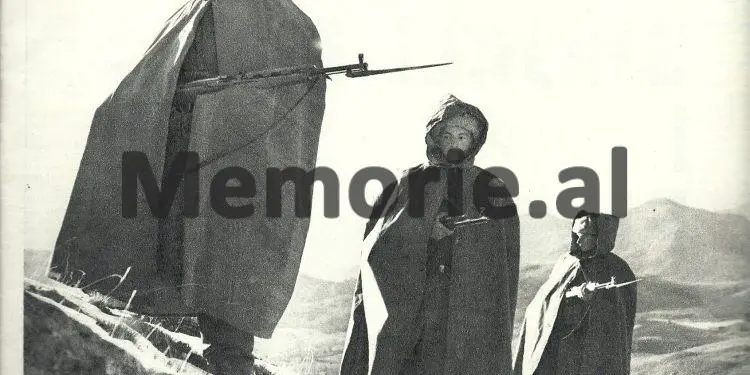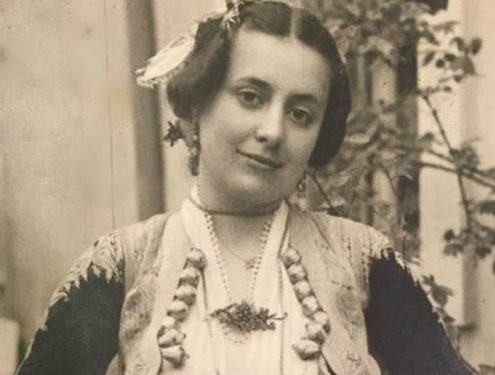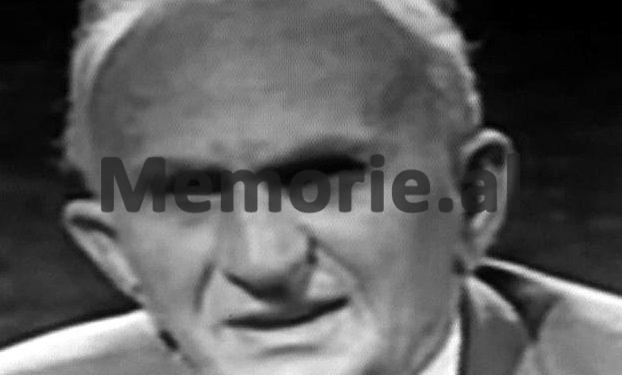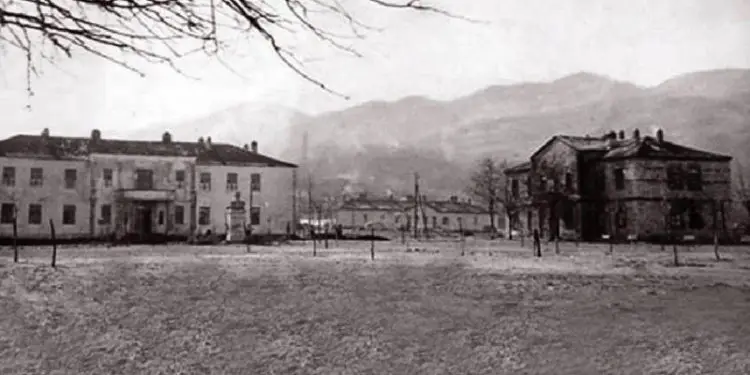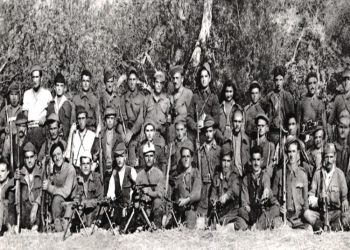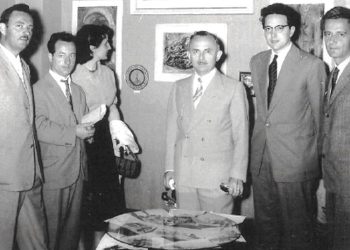Dashnor Kaloçi
Memorie.al publishes the unknown story of Musine Kokalari during the period that she was interned in the city of Rrëshen, where she was interned after suffering 18 years in prison in Burrel. Rare testimonies of Shaban Doçi, originally from the village of Arrën, Kukës district, and residing in Shkozet, Durrës, a former political prisoner who had suffered 18 years in prison on charges of attempted escape and as “part of a UDB gang ”, he was interned in the city of Rrëshen, where the family of his wife, Yldishan Izet Kalo, who was convicted with the“ Teme Sejko Group ”, was a neighbor (door-to-door) with Musine Kokalari for 20 years. Musina’s last conversations with Shaban Doçi, the last messages she gave him, and his vicissitudes to convey to his last apartment, after she passed away on August 13, 1983.
37 years ago, on August 14, 1983, Musine Kokalari, Doctor of Science, Laureate of Literature in Rome in 1941, died in the city of Rrëshen, after trying to establish a Social-Democratic Party together with some of her other intellectual intellectuals, who had graduated from Western universities, were imprisoned shortly after the communists came to power (January 17, 1946), having previously been in the last days of the War, in November ’44. , the communists had shot two brothers, Vesim and Muntaz Kokalari, in the basements of the Hotel “Bristol” in the center of Tirana. After being sentenced to 20 years in political prison, as an “enemy of the people and a saboteur of the Anti-Fascist National Liberation War”, she suffered 18 years in Burrel prison and was then sent into exile in the town of Rreshën in Mirdita district, where she spent 20 years. end of life, working in the Construction Company as a mortar worker and in the Municipal Enterprise as a street sweeper. Much has been written and spoken about the figure of Musine Kokalari after the 1990s, especially after the publication of her file by the Information Office of the former State Security Files headed by Mrs. Gentiana Mara Sula. But one of the first people who knew him closely and was pronounced in the press publicly (“Gazeta Shqiptare”, year 2000), was Mr. Shaban Doçi, a former political prisoner, who after talking about the story of his life, stopped and testified about the acquaintance with Musine Kokalari and the last conversations with him shortly before she passed away. The interview in question with Mr. Shaban Doçi (originally from the village of Arrën in Kukës and living in Shkozet, Durrës), Memorie.al is bringing it back in full for its readers, on the occasion of the 37th anniversary of her separation from the life of Musine Kokalari.
Mr. Shaban, here in your sentence documents, it is said that you were a member of a gang and tried to escape?
I was not only a member of the gang, but also its leader. It was not a gang in fact, we wanted to save the skin from the communist dictatorship of the proletariat, so we had decided to escape. There were 5 of us, a friend among them was Isa Mena, who was killed. He had no plans to escape, but his brother died in prison and he could no longer endure here, as he too would end up there. Everyone from the Mena family of Dibra has been killed, as they have not cooperated with any regime, except with King Zog. The other three I did not know, that they were friends of Isa and he made us actually carry out his presence with our group, thinking for good, as for himself.
Where did you work before you decided to flee Albania?
I worked as a builder, then moved on to a construction company. I wanted to go to work and live in America as an immigrant, I was not involved in politics, neither in prison nor abroad. However, I had a close friend, Isa, and I felt sorry for him, we wanted to leave at all costs, but he had a political goal, to join King Zog. I had no political purpose, I just wanted to cross the border, to go and live without suffering. But Jesus changed my plans.
… Why ?!
The people who were going to escape should have been able to walk, but these others were sick, one was a professor, his name was Idriz Halluni, the other had graduated from the Royal School. According to the plans we had made, we went on May 1 to take them to Tirana. We had decided to go to Lura or near Kukes by car or on foot. But when we got to Mamurras, we changed direction.
What was the point from which you would escape, so where did you plan to cross the state border?
From Korab, because we had checked the situation before we escaped. I walked all night, but I lost my temper and said to one of the group: If you do not have faith, we will separate, we will each separate in our own way. But he could not travel without me, since we also had family and friends. We walked all night, Idrizi got sick and we took him in our arms. These others were aged 45-50, only I was the youngest, 27 years old. Idrizi and Sebastian were not able to walk, as they were ill.
Seeing the situation in those conditions that they were, how did you decide?
I told them to go back and not get lost in vain and die on the streets, but my friend, Isa, said: no.
How many days have you traveled?
We traveled from 1 to 15 August 1961, ie two weeks in the mountains. From Mamurras we went to the area of Shkopet and from there we passed in the middle of the district of Mat to get to Lura. We were supplied with bread and fled. When we went to Lura, we were noticed, because as soon as we came out, the chief, the omnipotent of the area, was notified, and even what we were wearing we were told. From that moment on, big and small in the North rose to their feet to catch us.
Once you realized that you had been dictated to and that you were being persecuted, where did you go next?
In a place called Skavica, there is a mountain and a forest, where we entered until nightfall. I left my bandmates there and went looking for bread.
Where were you supplied with bread, in the shops?
No, no, in the villages, I told them that I was selling, that I was supposed to trade, and that I had a child with me, and we had no bread to eat. So I lied. When I went again, all my friends hugged me because they thought I left them there and I surrendered, I abandoned them. This is bad, when you do not know the other, I do not know what happens to you. After eating that little bread, we set off towards the mountain of Korab, passing the main point from the Castle of Doda. A civilian volunteer patrol passed us by and said nothing.
How is it explained… ?!
They pretended not to see us. People did that task just for a piece of bread and to go home. The common people were good, but the dictatorship was such that nothing could escape them. We went to the last point of Mount Korab and there we saw two lights. One of the post office and one of a high house. Jesus said let us choose another, I said another.
How did you decide after that, so which of you two was right?
Jesus was right in fact. We headed in the wrong direction, which we only saw in the dim light of the morning. We stopped and turned. Luckily, that night some four fingers of snow fell and from the half of Korab onwards, there was so much fog that with putting your finger in your eye, you could not see the other. I did not take Idriz by the arm and told him: I left my father to die, and I did not let him cross the border. He did not leave, he was exceedingly faithful. But since we were very tired, Jesus went and then surrendered. He did not go for that purpose in fact, but Sebastian did the same afterwards.
What did you do after they went to surrender?
We continued to walk and where there is a peak with many turns, it is difficult to orient even if you were born in that place. At that moment I told Sebastian once again to stop, but he did not, but when I told him a second time, he stopped. I was afraid of parting with Isa, that he was completely broken. Meanwhile Sebastian turns down, where he sees a couple of children with sheep. He asked them where they were, asked for a piece of bread, and told them to tell them where the border was. They took him to the house, where he in good faith had told them about us, telling them not to give up. Meanwhile we continued the itinerary, we passed three turns to the next path and we did not see Isa again. I took the left, and he took the left half, so we lost to each other. I crossed to the field of Korab, where instead of going right, I took the left. I entered a cattle hut where I hid my weapon while watching from afar groups of people large and small walking down the street, along with Army forces where we also heard gunshots.
You, who were you with in the meantime?
I only had Skënder Taka with me and I said: “Isa Mena will be killed” ?! “No,” he told me. We heard gunshots again, and when it got dark, we continued on our way again. When we went near the Drin River, we wanted to change the route, as there was no possibility of penetration, so I wanted to change direction to another area, to then cross the border. I went to a village store to get a pack of cigarettes and to ask more about what had happened to Isa. There I was caught, without entering the store, at the store door. It was August 22, 1961.
Who caught you?
The one who caught me, a former officer, now retired, is today in Durrës with his family. (Pioneer Xh. M. from the district of Dibra, who was decorated and then to make the feature film “Valley of the Riflemen” by Kinostudios “New Albania”). After tying my hands from behind with rope, they put me in a car and took me to Kukës where they told me: “Let’s kill Isa”.
Did you find out there that they killed their friend?
Right there, but I said ‘better to have killed him than to have been caught alive. That was the job of the group. ” From Kukes I was sent to Tirana, from Tirana to Durres. The Special Military Court investigator took us there, because they suspected that we had no connection with Teme Sejko’s group, as Skënder Taka had a nephew Teme Sejko, but I did not know that. Investigators accused me of being the cause of everything that happened and in the processes that drafted them and asked us to accept and sign them, it was said that we were part of a UDB gang. These scenarios were prepared by the State Security, for anyone, not just us. None of us had anything to do with what the Security was saying and accusing us of, as those in the group belonged to King Zog’s inner circle, except me, who wanted to flee to America as a refugee. We had no connection with any external or internal gang.
What were you looking for in the investigator?
They wanted to force me to say that if the army came out in front of me, I would kill any soldier. The investigator and prosecution representative held me 30 days with this indictment inside. Why would I kill a soldier, what would he do to me? In the end I said to him: ‘If I started a war with the Army forces, if I saw you 500 meters away, I would kill you, not the soldier’. The investigation was then closed.
What do you think of the action of that person in your group who denounced you for running away, why did he do that?
He must have masculine sedation to say there is no guilt. What he did, anyone could do, that was the time then and we went to him “even at the door”, as they say a word.
Where did the trial take place and how many were sentenced?
The trial took place in Durrës and from the 22 years that the prosecutor requested, the court reduced me to 15 years in prison.
How many years in prison did you serve and where did you serve your sentence?
I worked for 11 years, 2 months and 7 days, I earned the rest with work, with two rates per day. After the trial, I was first sent to Tirana to the Meat Factory, then to construction, where I practiced my profession. I worked in the palaces next to the State Bank, where the whole area, up to the former houses of the Italian pilots, I had under my patronage, I was an agile specialist in all works. Then they took us to the Laç factory, then to Rubik, where they had decided to appoint me a quality technician. I was called there by a Bajram Korvafa, a camp commander, animals at all, the most rude and wicked man in the camps. He was drunk all the time, carrying a cork and a bottle of brandy in his pocket.
What did the camp commander ask you?
He told me that they had decided to be a quality technician, provided I made the list of those who did not do the norm. Because those who did not do the norm, were taken to work morning and afternoon, while at night in the dungeon. I said, ‘If I were such a good man, I would not have been in prison, I would have stayed out.’ I was put in jail for 30 days for what I said. In the dungeon I found one of those of the group of journalists, Robert Vulkani, he is in Tirana today. While I was in that camp, a group of Chinese engineers and specialists were brought in to specialize in smelting furnaces. What I am telling you is a previously unknown thing, namely the fact that we prisoners specialized with the Chinese. But at this time with the Chinese, they had a friction, because when the Chinese chief engineer came and I was handing over the boiler, he asked me how many years I had been sentenced. “15 years in prison,” I say. “For what?” He asked me. “To escape,” I told him. “There is no possibility,” he tells me. “We in China are transferring from one province to another those who are trying to escape.” Meanwhile, the chief engineer goes and tells the commander, Bajram Korvafa, that he was very angry. The commissar intervened, the situation became so aggravated that the chief engineer was removed from there. The Chinese were surprised when they asked us what charges we had been convicted of.
From that camp, where were they then taken?
From there they took me to Laç where the Superphosphate Plant was being built with commander Hazbi Lamçe from Mallakastra, then to Fushë-Krujë where the Cement Factory was being built, then to Elbasan, and later to Pishë-Poro in Vlora. There they put us in the swamp, we had Commander Sulejman Manoku, former Chairman of the Internal Affairs Branch of the Bishopric. When he found out that I was Isa Mena’s friend, he called me to his office and said: “Wasn’t Isa Mena a politician”? I replied: ‘do not you know yourself a politician, that you are a camp commander’ ?! The next day he gathered the camp to expose me as an “enemy of the people”, where a related Dibran, the exposed spy, told us comrades: “If US imperialism and Soviet revisionism attack us, without violating your troops, I’m not going to fight. ” After that meeting he informed me that he would “peel” me from there and kept his word.
Where did they take you?
On the seventh day, they take me by car to Spaç in Mirdita, underground, where I worked for 4 years, even though I had a doctor’s report. From Spaci they took me to Ballsh, where I was later released and went home, which I did not find, because I had been ruined.
How did you do, where did you settle down?
I slept for some time on the Drin bridge, looked for a job and was put under construction in Kalimash. At this time, I wanted to start a family and I was talking about getting engaged to a girl who had a father in prison.
Was it hard to start a family for a man like you who had just been released from prison?
The hardest thing I have not seen in life, they did not leave us. This girl had been fortunate, or granddaughter, or cousin of Azem Kërxhaliu, Chairman of the Executive Committee of the Kukës district, and she accepted with all conditions. But even in marriage they did not leave us, because the Internal Branch intervened. I was called to the office and told that you should not get married without our permission. I told them that: Albanians, even in the time of the Turks, were not forbidden to get married. Maybe you, I told him, gave Enver Hoxha this right ?!
What did you do after those obstacles to getting engaged?
Having no other way, I was forced to write a 24 page letter to Enver Hoxha about this.
What did you write to him, in short, what did that letter you sent to Enver Hoxha contain?
It contained my family biography, the prison I had made, and that I sought to start a family. And how is it possible that they asked me not to get married ?!
Did the answer come?
The answer came, I was a sister in the village, my fellow villager Gani Daci, the former instructor of the Kukës Party Committee, came to read the letter. The letter was personal from Enver Hoxha, and sought to see how many truths and lies he had. I went to Krumë, they took me to the construction sector in the brigade, where no one worked with me. I did a couple of weeks alone, then crossed with the brigade. I in person plastering, even though I was a high-level specialist, object implementer. Carpentry was the hardest, so I was assigned, I was dealing with armor alone. I do not know how I escaped alive, because this work is not done alone, it takes a group.
In conclusion, did anyone agree to marry you?
Not there and with a lot of vicissitudes then I was able to spend it in Lushnja, as I did not find medicine. A former prisoner, Mirditor, tells me about a family interned in Rrëshen, by the group of Teme Sejko, the daughters of Izet Kalo Osmani. I went and agreed to get married. But when I was returning to Kukës, as soon as I left, someone said to me: “Make no mistake, take it, it is dangerous”.
Where was the danger according to them?
They have to say that, because in Spaç, before I was released, the deputy head of the Kukës Branch came to recruit me. We had Gjergj Zefi as an operative, who is alive today, he came and said to me: “Why don’t you beg us to be released” ?! “Why should I be released?” I said, “I have no home.” He said to me, “You have a sister,” while I said, “I have, but she has her own house.” Plus I told him, I have a lot of illnesses. “What diseases do you have,” he told me. I told him: ‘the main thing is that I am a psychopath in a reactive state’. He lit a cigarette, went outside and did not enter.
You joined the Osmani family, so you married one of the daughters of this family?
Then they allowed me to get married and I started working there in Rrëshen, but the district did not accept me, they took me to the farm. I was forced and sent a telegram to the Prime Minister, Mehmet Shehu, with these words: “Why did you take me to the farm, I am a construction specialist”. It did not take long, the answer came from the Prime Minister, I went to construction, but they took me to the most remote and difficult sectors, in Kurbnesh, Rreps, etc. So they did not leave me in the center, where there was a need.
Where did you live in Rrëshen?
In Rrëshen, he entered a building near the construction company, near the Collection Depots, in a room where not even a dog lived. Another room was occupied by a farm agronomist. They took away my light, and left it to him, while he put a blanket on the window so that I could not see that there was light. I was registered to get a house, the list went to the mayor, he put a visa in my name. It was the second telegram I made to Mehmet Shehu, so they gave me a house. But the thing was that my wife Yldyshan Kalo, when we got married was 40 years old, so in 2-3 cases the children died in the womb, because they did not let me take her to Tirana. I went to Dr. Mark Lleshi, I told him how to do it. “The only way is to go with a report on psychopathy, not on the child,” he told me. That’s what we did, I got the report. The next day, he came to my house at 11:00 and told me that if I took the woman to Tirana, I would take her by the neck, because I do not know what another mistake he had made. The woman lost her fourth child in the womb, while she became pregnant for the fifth time and I then sent a letter to Mehmet Shehu, who gave me permission to take him to Tirana, to doctor Ilir Gjylbegu. From him I have this girl that I have today, because I would not have this either.
During the period you stayed in Rëshen, did you know Musine Kokalari?
My wife, Yldyshani, has lived next to her, face to face for 20 years. Even when I got married, Musineja did not approach me because she did not know me. When I got home to the palace, one day came to get the milk in the queue. Musineja came, gave me the bottle. Before me in line, was the Chief Operating Officer of Security. When he saw me behind him, he finally ran away. She called him, because she knew him. She just laughed, so. So he started coming to me every Sunday. But we usually went to work on Sundays, because it was’s Enver’s birthday, St Stalin’s birthday, etc. But when we were on vacation, he would come and drink a coffee.
What about the last year she passed away, how do you remember her?
I remember very well that when she got sick, I said to her: Shall I take you to Tirana? “No, he told me, I go myself.” It is about the year 1982 -’83. Musineja lived next to my sister-in-law, they had put an invalid in the hall, to check who came in and out. But no one came in to her except me. Went visited, came out with breast cancer. I had my wife in the last year of her medical studies when she was interned, so with the knowledge she had, she told him not to operate on her, because the wound would still be added to her. “Push until you push it,” my wife told him. But she did not believe in these things and went and had surgery.
Did you go to the hospital?
I went to the hospital with my sister-in-law, kissed me on both cheeks and started crying. I said do I come to pick you up. “No, he told me, I come myself.” When he came home, he called me and said, “I have a word with you. “You will give me the word of the men who will bury me,” he told me. I told her that it was not known who had to bury her husband. “If you die before, I will bury you like my sister,” I told her. “We do it by hand,” he told me, and I replied, “Yes.” We went to the desks to make the will. “I will leave these manuscripts here with you,” he told me. I said take it and keep it to yourself, why leave me this job ?! “Will you promise me”, he said to me: “Will you come to me every afternoon until 9 o’clock in the evening”? I said: I can not give you my word, because I work 11 hours a day. I went though. But as a rule, since my child was born, every summer I took her to the beach in Shengjin with my wife and left them there for some time.
Were you there those days when Musineja passed away?
I was there, it was August of ’83. I said: Musine, tomorrow I will go to take my daughter and wife to Shengjin ‘. He told me: “Do not go tomorrow.” I will go the next day, the woman must show up for work. “You have the Museum here,” I said to my sister-in-law. She replied: “Ishalla when you come, to find me alive…” ?! As soon as I went, my sister-in-law, Myzejen, received a telegram from Elbasan, to go there, because her uncle’s son had been injured. Musineja died at 9 pm while I was in Lezha. I return in the morning to catch the buses going to Rrëshen. I was told that Musineja was dead.
What did you do after that?
I went to my house first and then I went back to her house, but the door was locked, they had taken the manuscripts that were there, they had locked the door by order of the chairman of the Neighborhood Council. I went and told an Agim Harun who had the key. So-and-so told me. I went there, they told me they could not give it to me. I told them I had promised to bury him, I had received it in writing. I told them I was responsible for everything, just to get the key.
Did they give you the key?
I took the key, I went to Musine’s house, we took it out, we left it, we went to the Communal and we wanted to bury it next to the woman’s mother. But, the problem was that none of the Municipalities agreed to open the grave for Musine Kokalar, not even the car came.
What did you do after that, how did you act?
I got a rom to help me keep the funeral. I met Beqir Balluku’s son-in-law, Gjergji Gjergon, a physical education professor, who was also interned, and together with a Kosovar named Ymer, we opened the grave.
By what vehicle did you send him to the cemetery?
We transported the corpse by gravel truck from those dump trucks. The whole neighborhood has risen up and seen us with an extraordinary hatred ?! And why, because we were burying a dead man ?! Moreover, nothing had anything to do with Musine Kokalari, neither politics, nor the economic and social side, only that we lived there. Only my wife, sister-in-law and our child, together with Gjergj and the Kosovar, buried her and had lunch at her grave.
Did you find out anything, did Musineja leave a will, or an order, before she passed away?
Musineja, shortly before she died, had told my sister-in-law, Myzejen, that she should call Plato Kokalar, her cousin.
Did he come?
He came after 2-3 days, we gave him all the materials of Musine Kokalari, with my writing. Photographs, pension documents, ID cards, books of Enver’s time, even underlined, I have them all today. The truth is that all that they say, no, he had his hands tied with wires, etc., are all fabrications./Memorie.al
.




